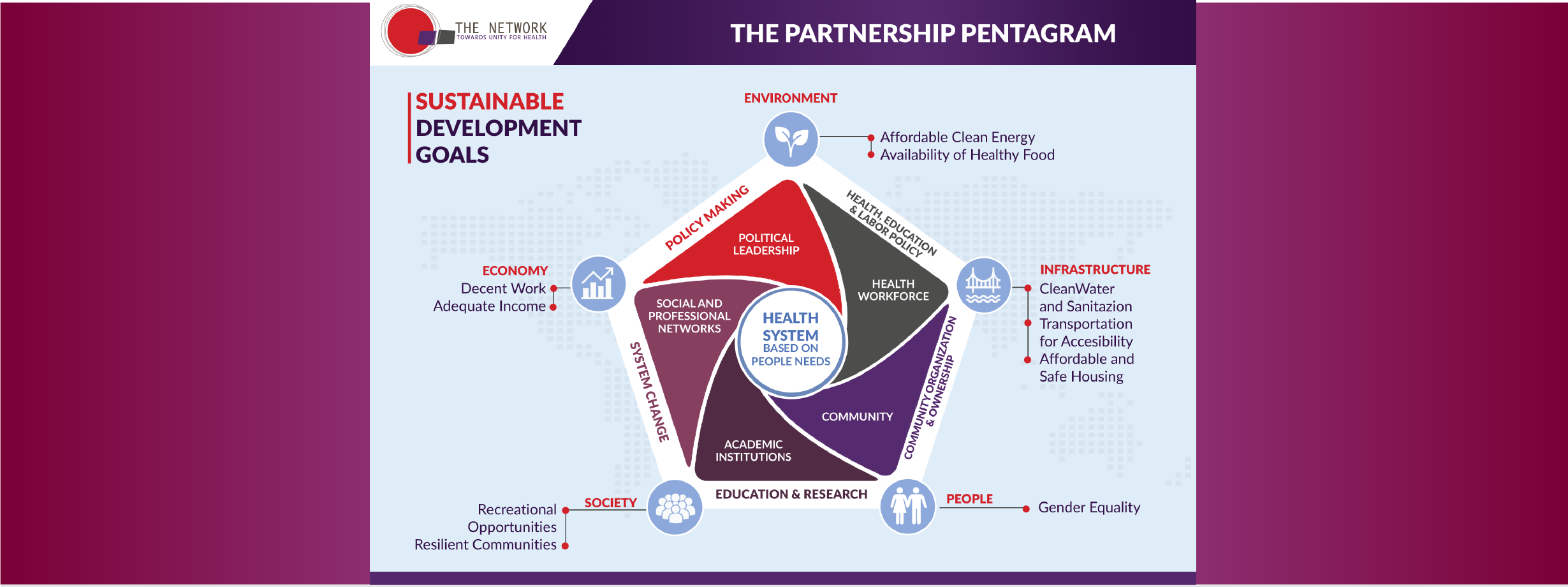Dear Reader,
This edition of the Social Innovations Journal is curated by The Network: Toward Unity for Health (TUFH), an official non-state actor of the World Health Organization. TUFH is driven by a moral compact to mend the fabric of our communities upon which health depends. The Network: Toward Unity For Health is committed to driving communal interests by supporting local change agents toward the adoption and implementation of global policy recommendations. TUFH concentrates its efforts on practical tools and solutions that achieve action by local change networks.
TUFH does its work by bringing the “Partnership Pentagram” to life by supporting local change agents and networks. TUFH’s “Partnership Pentagram” is framed within the sustainable development goals and social determinants of health, emphasizing that creating a health system based upon people’s needs must not only involve the five key players in the change process, but must do so within the context of where people live and work. TUFH engages policymakers, academic institutions, health professionals, and communities to collectively address the underlying barriers to healthy individuals and communities.
This edition highlights three policy action papers on women, migrant and refugee populations, and aging society health which were driven by TUFH’s policy fellows and guided by global thought leaders through TUFH’s taskforces. Each policy action paper provides concrete policy recommendations and actions steps for ministries of health, academic institutions, and health systems to adopt and implement. This edition also highlights best practices around the globe on the adoption and implementation of best practices in women, migrant and refugee, remote and rural, and aging society health.
Around the world, global health policy leaders and associations are convening global leaders, publishing research and policy articles, and releasing “call to action” initiatives for political leaders and health system institutions to adopt and implement. Many of these recommendations are framed within the United Nations Sustainable Development Goals, indirectly correlated with the social determinants of health, indicating that health is much broader than clinical interventions. Today, we witness hospitals and health systems being more like “repair shops,” trying to correct the damage of causes collectively denoted “social determinants of health.” The global fabric of our communities upon which health depends is torn and we must heal this fabric through communal interests.
We hope this edition is a first step toward healing this fabric.
Sincerely,
Nicholas Torres
Co-founder
Articles
Geriatric Matrix Support for the Family Health Strategy: integrating a Medical Residency Program in Primary Care
Luciana Branco da Motta
Aging Society
Sun-Ming Jessica Pan, Yi Li
In the Era of New Discoveries Emerging Everyday About Healthy Aging and Complicated Disorders, Elderly Tribal Women of Rural Remote Communities are Living with Treatable Disorders
Shakunatala Chhabra Chhabra
Health of Migrant and Refugees
Mengchun Zhou, Julia Lechuga, Akiko Maeda, Arthur Kaufman, Laura Parajon
Community-based Health Insurance Among Refugees in Rwanda
Eric MUGABO
Eradicating the Pandemic of Violence against Women (VaW) during COVID-19: the critical imperative for health
kumi, prof., Isabelle Luzuriaga
Every Woman Counts Fighting Pregnancy-Related Sepsis
Dr. Sandra Dimitri, Dr. Rania Hassan Ahmed, Dr. Mohamed Hamed Salama, Prof. Dr. Ashraf Nabhan
The Role of Medical Students at the University of Gezira in Promoting Women’s Health in the Gezira State
Mohammed Ahmed AL_mogadam
The Genesis and Revelation on Kangaroo Mother Care (KMC): What We Know So Far and What We Expect to Know in the Future from Ghanaian Perspectives
Ephraim Kumi Senkyire
Maternal Health Education Mini Campaign
Ala Khalid
The Influence, Choice and Use of Contraceptives by teenage girls in Sunyani west district, Ghana
Todd Nursing Maja
Building A Primary Care Center Through Interdisciplinary Collaboration
María de la Paz Grebe, Angel Centeno, Campos Soledad
A Case Study of Canada’s Rural Practice Training 21st-Century Journey
Dr. James Rourke, Dr. Ruth Wilson, Dr. Ivy Oandasan, Ms. Carmela Bosco
Mother and Child Health Suffers in Remote Villages with Extreme Poverty, Possibilities of Sustainable Services for Survival
Shakunatala Chhabra Chhabra
Issue 63 | Women, Migrant and Refugee, and Remote and Rural Health Care Best Practices
Typography
- Font Size
- Default
- Reading Mode



